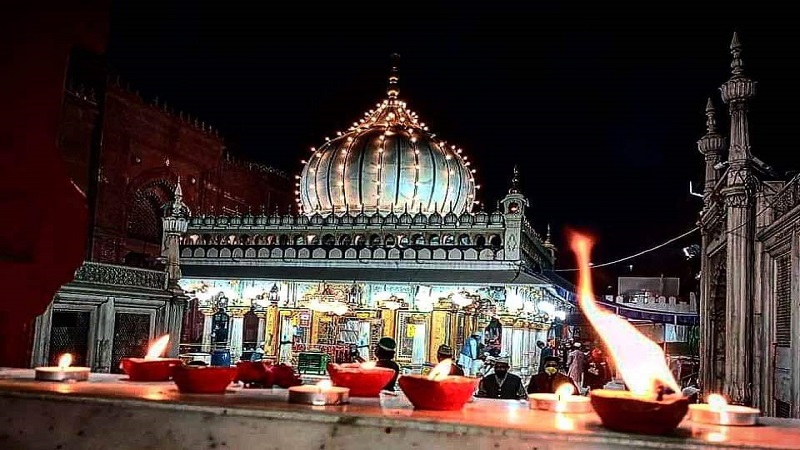
The beloved Nizamuddin dargah in New Delhi was once again bright in the glow of diyas this Diwali during the Jashn Chiraghan ceremony this year, although few were present to witness the wondrous sight.
On November 14, 2020, caretakers of the dargah kept up the age-old tradition to honour non-Muslim festivals by lighting diyas along the structure’s pathways and around the Muslim chaddar during Laxmi Poojan.
According to dargah trustee Sufi Ajmal Nizami, people from various religions come to the dargah in countless numbers during festival days. The mausoleum would be filled with people in brightly coloured clothes not only on laxmi poojan but also on bhai dooj and other religious days.
The dargah committee members pride themselves for upholding the teachings passed down by Sufi saint Muhammad Nizamuddin Auliya also known as Hazrat Nizamuddin.
The “beloved of God” was one of the most famous Sufi saints in the Indian subcontinent who preached the teachings of love as a means of realising God. One can easily trace the dargah’s benevolent attitude to Nizamuddin’s teachings who disapproved of any distinction between humans based on social, economic and religious status.
Known for its evening qawwali sessions, Diwali would also be celebrated in a similar manner at the dargah with devotional songs echoing through the building.
However, this year celebrations had to be toned down in keeping with the community guidelines set due to the coronavirus pandemic. Evenings that witnessed countless footfalls exiting and entering the building only observed around 100 visitors on Saturday evening. Even among the handful of visitors, there was no child in sight nor could a single musical note be heard.
Nonetheless, the sight of the age-old, benevolent practices soothed the unease of many people in the area who posted pictures of the dargah on Diwali evening.
For those who always trying to spread hate seech against Islam and makes it the only enemy to other religions by forgetting how we are sharing a land and certain identity to be called our Home our country ..
” #Diwali celebrations at Hazrat Nizamuddin Dargah” pic.twitter.com/mWGgATEfbq
— هديل بوقريص ? (@HadeeLBuQrais) November 15, 2020
हम ऐसे भारत की कल्पना करते हैं..♥️ भाईचारे की दिवाली, ख़ुशियों की दिवाली? #HappyDiwali Nizamuddin Dargah pic.twitter.com/hA7zV6cOIq
— Iqbal azad (@Iqbalaz51874662) November 15, 2020
It brings tears to my eyes that the Nizamuddin Dargah lights up on Diwali despite the rise of Hindutva in the country.
I hope we find I way to strengthen & celebrate the best part of India – not tear it down – diversity of language, religion & culture pic.twitter.com/BtYIUObLUa
— Payal Parekh (@payalclimate) November 15, 2020
Those soothed by the festival diyas included Sufi Ajmal as well who loved the presence of light during Diwali above all.
“While seeing the diyas, we pray to Allah to enlighten our hearts. The diyas lighted in every corner during Diwali are truly a wonderful sight,” he says. Incidentally, the dargah also observes the Dua-e-Roshni ritual wherein evening prayers are sung in the presence of lamps.
Sufi Ajmal smiles whenever he hears the lighting of diyas at the dargah being described as a secular tradition.
“We are born secularists and nationalists. We [Sufis] have lived here for 800 years, long before this country came to know the term ‘secularism,’” he said pointing out that the dargah even welcomed more non-Muslims than Muslim visitors at times.
Attributing such instances to Nizamuddin’s teachings, he told the legend of the sufi saint who had once promised his Pandit neighbour that he would ring the temple bell if the Hindu priest was ever unable to do so.
“Once the priest in fact could not ring the bell and Nizamuddin came through on his promise. Such were his feelings of friendship towards the Hindu community,” says Sufi Ajmal.
However, the Sufi saint alone was not the sole inspiration for the committee’ secular outlook. Sufi Ajmal says that Sufis have always believed in adhering to the law of the land.
“Ever since Sufis came to India, we have only offered langar and good will to all. We will continue to do so,” he says.
When asked whether he felt any worries due to recent communal tensions, the trustee says that Sufis would always adhere to respecting the law of the land. He also asserted that they are a part of this country and that they will stay here as long as they can.
At the heart of it all, Sufi Ajmal says committee members hope for a free India envisioned by Amir Khusrau who wanted an India where there are no foreign nobles in the court.
Related:
Pakistan: Goddess Durga’s idol vandalised in Sindh during Navratri
Vrindavan’s ISKCON temple sealed as priests, and many others test Covid-19 positive
Dharma and humanity are like our two eyes: The secular philosophy of Jhansi
In Tamil Nadu, Hindus observe ‘Allah Festival’ on eve of Muharram